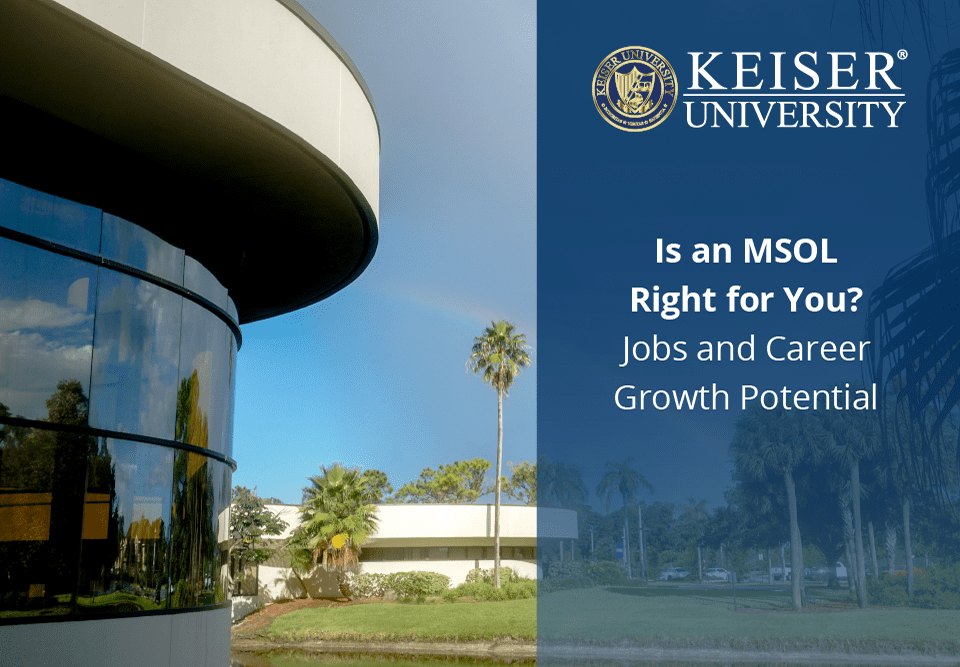Setting the tone for workplace culture and implementing a strategic vision for success, leaders play a central role in any organization. As you continue to advance in your career and move into leadership positions, you may organically develop a leadership style. However, by investing in leadership development and pursuing a master’s degree in organizational leadership, you can hone the strategic, analytical, and soft skills required to effectively lead in the contemporary business landscape.
What Is an MSOL Degree?
The Master of Science in Organizational Leadership (MSOL) is a graduate degree program designed for aspiring leaders who strive to excel in professional leadership roles. This interdisciplinary degree program does not target a specific field or industry, which enables graduates to develop transferable skills that can be applied in numerous fields. Jobs with a master’s in organizational leadership are wide-ranging compared to other graduate degree programs, making this a worthwhile investment of your time, energy, and financial resources.
Distinguishing MSOL From Other Master’s Degrees
Business professionals and aspiring leaders may consider a number of other master’s degree programs, most of which focus on a specific industry or specialty areas. The MSOL degree, on the other hand, offers a broad scope, focusing primarily on leadership skill development and applied management theory. As a result, there are more career options with an MSOL degree than with other master’s degree programs.
Core Curriculum and Learning Outcomes
The curriculum for the MSOL degree is anchored by leadership theory, allowing students to engage in applied learning to develop the practical thinking and decision-making skills required in professional leadership positions. The coursework covers a broad variety of topics, such as:
- Strategic management
- Conflict management
- Team building
- Negotiation
Common learning outcomes include the ability to:
- Assess the legal and ethical responsibilities of an organization.
- Develop and influence policy that leads to organizational change.
- Identify and interpret alternative solutions to organizational challenges.
- Better understand group dynamics and improve teamwork within an organization.
- Effectively communicate in documents and presentations.
Who Is the MSOL Designed For?
Promoting a deep understanding of ethics, strategic management, and motivation theory, the MSOL degree is designed for professionals across industries and sectors.
Aspiring and Current Leaders
Professionals aiming to advance into leadership positions can uniquely benefit from the MSOL degree, as the curriculum and coursework focus specifically on leadership theories and change management principles. Through applied learning, aspiring leaders can develop the actionable skills needed to lead any organization, regardless of their field or specialty area.
Professionals Seeking Specialized Leadership Training
Professionals who want to be effective team leaders will benefit from the MSOL program’s targeted training — focused heavily on the practical, technical and strategic skills required to build camaraderie, resolve conflicts, and develop solutions to complex challenges.
Individuals in Nonprofit, Government, Education or Healthcare
Organizations competing in the modern economy find that conditions are constantly changing, which can make leadership challenging at times. Individuals in leadership positions for nonprofit organizations, government agencies, educational institutions or healthcare facilities will find that the MSOL degree helps them learn how to lead through change, engage in strategic planning, and motivate those around them.
Aspiring Consultants, HR Managers, Project Managers
Consultants, human resources (HR) managers and project managers must lead teams and keep them motivated in order to achieve their short-term and long-term goals. That is why these professionals can benefit greatly from the MSOL degree program; it allows students to explore leadership theories and learn how to apply leadership principles in a way that motivates others, encourages growth through change and promotes a positive workplace culture.
Is an MSOL Right for You?
If you are considering a graduate degree program, you may wonder if the MSOL degree is the best choice for you — as well as what jobs you can get with a master’s in organizational leadership. In addition to exploring the top master’s in organizational leadership careers, assess your own personal and academic goals before deciding to enroll in this program.
Ideal Candidate Profile
As you begin to explore this degree program, ask yourself the following questions:
- Are you passionate about developing people, inspiring others towards achieving a shared vision or goal, and fostering positive work environments?
- Do you enjoy problem-solving related to organizational dynamics and human behavior?
- Are you seeking to lead without necessarily focusing on financial or operational minutiae of an MBA?
The ideal candidate for the MSOL degree is an experienced professional wanting to invest in themselves and pursue career advancement opportunities. Students who thrive in this graduate degree program are:
- Self-motivated
- Organized and detail-oriented
- Passionate about leadership
Heidi Hales-Walker: A Journey of Leadership and Achievement at Keiser University

Common Jobs for MSOL Graduates
According to Indeed, organizational leadership encompasses leadership skills, professional ethics, effective communication and emotional intelligence. The MSOL degree program hones these skills and many more, enabling graduates to explore various different jobs with a master’s in organizational leadership. Below are some examples of jobs you can get with a master’s in organizational leadership degree:
Leadership in Human Resources
In many ways, human resources professionals set the tone for workplace culture in an organization, requiring them to be successful, intuitive, and empathetic leaders. The MSOL degree can help you enhance your HR leadership skills along with your ability to motivate, empower, and encourage your team members.
Human Resources Manager, HR Director, Talent Development Manager
According to the United States Bureau of Labor Statistics (BLS), human resource managers are responsible for planning and coordinating the administrative functions of an organization. With a graduate degree in organizational leadership, you will have a unique ability to attract and retain top talent in your field, allowing you to consider positions as an HR manager, director, or talent development manager.
Entrepreneurship and Coaching
In both entrepreneurship and career coaching positions, leaders often work independently in order to achieve success and help others reach their goals. While these career paths are more independent than others, effective and strategic leadership is still critical. An MSOL degree can uniquely prepare you for either of these self-driven fields.
Leadership Coach, Business Owner, Consultant
Independent leadership opportunities you might consider with an MSOL degree include:
- Leadership coach – Working closely with professional leaders, leadership coaches provide motivation and encouragement as their clients strive to improve their management style.
- Business owner – Responsible for their own success, business owners need to know how to attract top talent, create a positive workplace culture and lead through inevitable change.
- Consultant – Partnering with experts in a wide range of fields, professional consultants must be able to analyze, assess, and evaluate the health of an organization, then provide actionable guidance on how that organization can improve.
Driving Organizational Effectiveness
Professional leaders responsible for developing and implementing organizational strategies need to possess the practical skills necessary to apply leadership theory and management principles in real-world, workplace settings. With an MSOL degree, you may consider several different organizational leadership career paths.
Management Analyst, Management Consultant, Organizational Development Specialist
Management analysts, management consultants, and organizational development specialists all share something in common: They have to be able to collect data, analyze results and develop evidence-based organizational strategies designed to promote growth and sustainability within their organization.
Project and Operations Leadership
Those who specialize in project and operations leadership should be organized and detail-oriented individuals who know how to establish goals, delegate tasks and promote team-building within their organization — making this an ideal career path for MSOL graduates.
Project Manager/Coordinator, Operations Manager, Program Director
The BLS notes that the field of project management involves a range of tasks, such as developing schedules, managing resources and monitoring costs as well as performance. Project managers, operations managers and program directors must apply knowledge and business management theory to accomplish their goals.
Leadership in Specialized Sectors
While the MSOL degree offers a broad scope, it promotes leadership in the following specialized sectors:
Healthcare: Medical and Health Services Manager, Healthcare Administrator
Medical and health services managers work alongside healthcare administrators to oversee the administrative operations of a healthcare facility, calling for advanced business acumen as well as significant healthcare experience. According to the BLS, communication, leadership, and analytical skills are crucial in this field.
Education: School Principal, Postsecondary Education Administrator
School principals and education administrators are responsible for overseeing all operations in a school building. Interpersonal skills, critical thinking, and decision-making skills are essential.
Nonprofit: Nonprofit Director, Program Manager
Nonprofit directors and community service program managers must rely on their business acumen to manage resources and develop programming that benefits a specific population. Per the BLS, the most successful nonprofit leaders are those able to communicate, manage, and problem-solve.
Government: Public Administrator, Various Leadership Roles
Those who work in administrative services have a responsibility to achieve agency goals while effectively managing public funding. Leadership and analytical skills are necessary in government administration positions.
Explore the Top Master’s in Organizational Leadership Careers at Keiser University Graduate School
Strong leadership is required in every sector, meaning there are various career options with an MSOL degree. At Keiser University Graduate School, the Master of Science in Organizational Leadership offers a skills-based curriculum that emphasizes applied learning, through which students get the chance to examine workplace behaviors, explore, and apply psychological theories and understand organizational leadership principles. Graduates leave the program with the ability to engage in strategic planning and implement the most effective management practices.
Contact a graduate admissions counselor today to learn more about the benefits of earning an MSOL degree.






 The instructors at Keiser University impacted my life. They believed in my ability to become a great graphic designer, regardless of how I felt about my skills. KU helped to prepare me for the real world and got me to where I am today.
The instructors at Keiser University impacted my life. They believed in my ability to become a great graphic designer, regardless of how I felt about my skills. KU helped to prepare me for the real world and got me to where I am today.
